Here we honour our fellow campaigners and comrades who have passed on
- Tony Marshall, March 2016
- Stuart Monro, September 2017
- Sam Semoff, January 2018
- Phillip Wearne, March 2018
- Julian Tudor-Hart, July 2018
- David Matthew Bailey, August 2018
- Ken Dolan, December 2019
- Pete Gillard, April 2020
- Ron Singer, May 2020
Tony Marshall, Camden KONP, March 2016
This is the message to our KONP members 26 April 2016: With great sadness we must announce the sudden and unexpected death of our comrade and friend, Tony Marshall, who died in his sleep 10 days ago. Tony was an active member of Camden KONP and has fought alongside others passionate to fight to save our NHS. Tony was retired from his career as a respected journalist and was an excellent photographer.
Part of Tony's legacy is his contribution to setting KONP on a firm footing to strengthen our battle for the NHS, as he tirelessly helped us through KONP's constitutional elections before Christmas as part of the election committee with Gilda Peterson and Coral Jones. KONP owes him a debt of gratitude for this.
Tony's latest and sadly his final triumph as a campaigner had been the outcome of his campaigning in Camden to expose the deficiencies of Care UK and their predecessor Harmoni in their performance of the Out of Hours primary care contract in Camden and Islington. He helped engage widespread local support in the process. When the Out of Hours contract was re-tendered on a five-borough basis, Tony was instrumental in bringing people together from across the five boroughs to campaign for the contract to go to local GPs. It is good to know that Tony was able to celebrate the success of the campaign in ousting Care UK before his untimely death.
He was a man of integrity and intelligence. We are very sad that we have lost him. We send our sincere condolences to his family. May he rest in peace.
Stuart Monro, Save Lewisham Hospital Campaign, September 2017
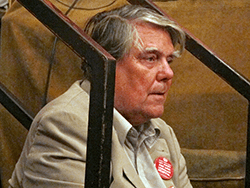
We will always remember Stuart’s enormous contribution to the Save Lewisham Hospital Campaign. From the early day, as a video maker, he captured in film our entire campaign. His was an extraordinary contribution: he saw the importance of documenting the growing strength and confidence of the Lewisham community, campaigners and supporters. This made a real difference to our campaign, enabling us to reach thousands upon thousands of people beyond Lewisham at the time, and to share the optimism and achievements of Lewisham up and down the land.
Stuart was proud to be a campaigner with us and so pleased when elected as a steering committee member.
In all weathers, and often with his wife Charlotte, he travelled to and fro between Wanstead and Lewisham to help at every step of our struggle to save the NHS. He never failed us with his commitment and love. We will always miss him and never forget Stuart Monro. [Obit. by Tony O'Sullivan]
Sam Semoff, Merseyside KONP, January 2018
Sam Semoff died peacefully on 11 Jan in the Royal Liverpool Hospital after a long illness. Hundreds of us in Liverpool and elsewhere knew him as a friend and comrade. He was warm, intense, committed, and ready to engage with anyone he met. He lived in Liverpool 8 (Toxteth) as an American in exile, an anti-racist, lifelong opponent of Zionism and supporter of the Palestinian people. We knew each other best through his work in defence of the NHS. As a founder member of Keep Our NHS Public Merseyside, Sam continued chairing meetings even while carrying an oxygen bottle and undergoing dialysis.
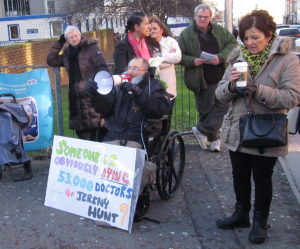
No-one – porter, domestic, nurse, medic or Consultant - got within a few feet of Sam in hospital without being asked their attitude to the Private Finance Initiative (PFI), or the latest government plans to undermine the NHS. During the Junior Doctors strike, he persuaded staff to let him appear at the Atrium window above the demonstration in the ambulance forecourt. Sam phoned through to a mobile pressed to the megafone and addressed the strikers.
Good morning everybody. I am a patient on the Cardiology ward here in the Royal. I’ve been in here two weeks and I can tell you the care has been absolutely great.
Jeremy Hunt is a liar – he says we need a 24/7 service, well we have 24/7 service. I have been in here two weekends and a doctor was always available, so were support services.
Hunt is also a hypocrite – he talks about patient safety, yet he wants to remove requirements that limit junior doctors working unsafe hours, putting patients lives at risk.
The doctors went into medicine to help people, their main concern is their patients’ needs above all else... Hunt knows this and takes advantage of it, he thinks he can push them to the limit and they will not do anything.
But they have said enough is enough, they know the risks to their patients in going along with Hunt’s proposals are greater than doing nothing. I wish a lot more health workers would reach that point.
The Government is determined to decimate the NHS and turn it into a market based health care system like in America. They have eroded the principles of universality, of a comprehensive integrated service that is publicly accountable and they are now working to undermine publicly provided, as the NHS is broken up into bits and turned over to the private sector where the overriding aim is profit.
When they get around to removing the principle of a service free at the point of delivery based on need, it will be too late.
I hope to see you out here next week and the week after.
Sam had been a community health activist for decades, as Katy Gardner reminded me. He was a patient at Princes Park Health Centre from the early 80s, when Dr Cyril Taylor was still practicing. Princes Park was more than a health centre, and Sam shared its philosophy of holistic health – treating the whole person in their community setting. It housed a library, with art and poetry in the waiting room. It was connected into the community through the Toxteth Health Forum.
Sam was instrumental in setting up the Forum, based in Lodge Lane. He edited its newspaper “Voices”, distributed door to door in Liverpool 8. Katy Gardner, then a GP at Princes Park, wrote a regular column. The paper reported on the Community Health Council and gave space to all types of local health groups. Toxteth Health Forum lasted 10 years, until the money dried up.
Sam turned his energy to setting up the Somali mental health project, MAAN. This aimed to raise the profile of mental health, and bridge the gap between the community and the mental health institutions – which knew little of the Somali community. It transformed the way the community viewed mental health, breaking the taboo, and educated the mental health trust. MAAN workers accompanied GPs on patient visits. Eventually the grants ran out, despite Sam's best efforts. Meanwhile he volunteered, helping Somali women with welfare rights.
Sam worked with Katy on a proposed study at Princes Park, to explore why Somali women were not taking their blood pressure medication and why health workers didn't appreciate or understand the reasons. Eventually, he got ethical approval for the research, only to be overtaken by his own illness. To top it off, NHS England handed the management of a dozen Liverpool surgeries, including Princes Park, to the private firm SSP.
That wasn't just an affront to Sam's politics. It was personal. Sam hit back with 10,000 leaflets in Arabic, English and Somali, delivered door to door and to every shop on Lodge Lane. He had been Sec. of Granby Ward Labour Party, and ran this like an election campaign.
It culminated in a public meeting of around 130, almost all of whom were current or former patients at Princes Park, furious at how the service had collapsed. It was held in three languages with interpreters and a two-way PA, allowing Somali women who sat with their friends in a side room to hear and address the entire gathering. The meeting led directly to a survey, a report, and the intervention of the Care Quality Commission which eventually kicked SSP out of Liverpool, though some NHS staff were victimised in the process.
Sam led the fight against PFI funding for the new Royal Hospital. He was vilified in the Echo, which ran the scurrilous headline “Bogoff Semoff”, claiming that an American was trying to deny healthcare to the people of Liverpool. No-one ever apologised for that, even when the newspaper finally woke up to the PFI catastrophes at Whiston Hospital and around the country.
Sam brought a Judicial Review which forced the Royal to re-run their consultation as they had not even mentioned that the new hospital would be funded by PFI. Every Liverpool Labour MP backed the scheme, as did Cllr Nick Small and Joe Anderson, at that time leader of the Labour group within the Council. The Royal PFI was signed off by Andy Burnham as Health Secretary on the eve of the 2010 General Election. Sam lodged a second Judicial Review, challenging the claim that the PFI would deliver Value for Money.
On 17 Nov 2010 BBC Radio Merseyside put Sam up against Joe Anderson, who declared "I know it doesn't provide Value for Money now or in the future, but it's the only game in town". That admission ricocheted all the way up to a Treasury Select Committee Inquiry into PFI. But the JR was derailed when Cllr Small approached the Legal Assistance Board and got them to pull the funding for Sam's challenge.
Sam had already left the Labour Party over Iraq, but rejoined more recently in support of Jeremy Corbyn. He joined Unite, and was active in the Community Branch of the union. He knew construction workers blacklisted by Carillion, but didn't quite live to see the company collapse with the new Royal half-built. A few days earlier, Sam commented “Workers united, is the only defence they have.”
When the news of his death came through, a demo at the Health and Wellbeing Board turned into a tribute to Sam.
We all miss him. Let's honour him by continuing the fight. [Obit. bu Greg Dropkin]
Julian Tudor-Hart, first hon president Socialist Health Association, July 2018
Dr Julian Tudor Hart, a founder member of the Socialist Medical Association and the first honorary President of the Socialist Health Association died on July 1, aged 91, in the week of the 70th anniversary of the NHS, which he fought so hard to improve and defend.
His death is a sad loss to socialists and campaigners: but his life’s work has left us better equipped to address health inequalities, and to understand the weaknesses and contradictions that limit the effectiveness of the NHS.
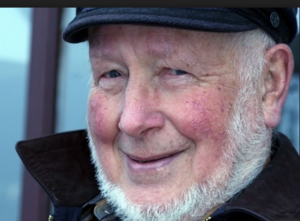
[photo: Wikipedia]
The opening abstract (summary) of that article is an example of Julian’s always compressed and lucid writing style and his skill in the brief exposition of a complex concept:
The availability of good medical care tends to vary inversely with the need for it in the population served. This inverse care law operates more completely where medical care is most exposed to market forces, and less so where such exposure is reduced. The market distribution of medical care is a primitive and historically outdated social form, and any return to it would further exaggerate the maldistribution of medical resources.
These linked themes so succinctly set out in 1971 have formed a near constant focus for campaigners and progressive academics since the late 1980s. Indeed, the concept can be read more broadly to argue that those with the greatest health needs are almost always those least able to afford the market price of health care as a commodity; and it can explain why those areas facing the greatest deprivation are always those with the least political power to force change.
However, Julian in his later years was increasingly reluctant to refer to the inverse care law. We might say that the importance Julian himself attached to the concept and the phrase was inversely proportional to the common acceptance and use of the term. He argued that the inverse care law detached from the wider social and political critique was relatively trite and unimportant.
He was angered by the ways in which the concept had been effectively devalued and hijacked by managers and establishment politicians seeking to claim a fig-leaf of concern for health inequalities while pressing forward with policies to deepen and entrench the purchaser/provider split and market mechanisms in the NHS.
For Julian, the key question was not neat phrases and clever argument, but testing and proving ideas in practice, improving not only the work of GPs but the social and organisational context in which they worked.
He worked for 30 years as a general practitioner in a health centre in Glyncorrwg near Port Talbot in South Wales, which became the first recognised research practice in the UK and pioneered the regular monitoring of blood pressure, proving it could help reduce strokes and premature deaths in high risk patients.
It was also characteristic of Julian to reject hierarchical notions of the GP or doctor standing above other health staff: he insisted that the doctor could only function effectively and fully as part of a team, and his research on blood pressure and other medical issues always stressed the importance of high quality records, teamwork and audit.
For Julian’s later work the concept of the team was widened still further, to include the role of the patient, who, he argued had to be seen as a principal factor in the “co-production” of improved health. This led on to the importance of continuity of care, which has just been underlined by recent research – at the same time as the latest faddish preoccupation with using apps and online consultations serves to weaken the links between GPs and patients. Julian wrote in 1994:
Continuity is not in practice valued in a competitive market, in which consultations are seen as isolated providers-consumer transactions, scattered between competing providers. (Feasible Socialism, p47)
He also emphasised the necessity of doctors (who had been shown on average to interrupt a patient after only 18 seconds of asking them why they had come) listening to patients rather than diverting them with premature questions:
Studies of medical out-patient consultations show that 86% of diagnosis depends entirely on what patients say, their own story. What doctors find on examination adds 6% and technical investigations (X-rays, blood tests, etc.) add another 8%. To most lay people and even some doctors these figures are astonishing, the reverse of the proportions expected. (Feasible Socialism, p 42).
As a fierce critic of the competitive market developed by New Labour from 2000, Julian was one of the founding members of Keep Our NHS Public in 2005. His most substantial book-length study The political economy of health care was first published in 2006, with a revised second edition in 2010. The mixture of Marxist analysis and clinical perspective mean that passages can be a less easy read than Feasible Socialism, and Julian was never quite satisfied with it, but the book offers many useful insights.
Julian was also active in collaboration with many experts and academics internationally, and a leading figure in the International Association of Health Policy in Europe (IAHPE): the last time I saw him speak in a public forum was at an IAHPE conference I organised at Coventry University in June 2009.
In his later years Julian became less confident of his ability to set out an extended and detailed argument in writing, and the last time I met him, for lunch at a restaurant in Swansea, he persuaded me to take on the production of a book on the clash between professional ethics and the market, and the problems in developing and maintaining patient-centred care.
However, this was just at the point that work began to launch Health Campaigns Together and the task fell by the wayside: Julian’s death is a powerful reminder of the need to return to this task and deliver a book worthy of its originator.
Many will miss the inspiration and support we had from Julian, who was a quietly spoken, friendly but steely-willed ally, with a complete commitment to quality health care and a far-sighted Marxist understanding of the contradictions of the health care system that has arisen after almost four decades of efforts to undermine the principles of the 1948 NHS.
But he and his work will not be forgotten as long as campaigners fight to defend, reinstate and improve the NHS and health care. [Obit. by John Lister first posted 4 July 2018]
Phillip Wearne, North Devon Save Our Hospital Services, March 2018
Phillip Wearne was a journalist and documentary film-maker. He was exceptionally intelligent, knowledgeable, determined and courageous. He was extraordinarily kind-hearted and considerate and performed countless little acts of personal kindness. He was generous with his time and recklessly spendthrift with his energy. He was enraged by, and fought tirelessly against, injustice, cruelty, environmental degradation and the greed, corruption and folly of our political leaders. He was always looking for recruits to the fight, and supported and encouraged any he found. He was a loyal and caring friend and was loved and admired, and is now sorely missed, by hundreds of people around the world. The world still needs him.
Phillip joined the march through Ilfracombe in 2015, organised by Green councillor, Netti Pearson, in defence of the Tyrell Hospital. He also joined the Junior Doctors’ picket line in 2016 and was one of the founding members of SOHS (Save Our Hospital Services), for which he quickly became the driving force, advising, exhorting, encouraging. He worked tirelessly, attending meetings of the group and also of the CCG and Devon County Council’s Health and Wellbeing Scrutiny Committee. He organised the leafetting (most of which he did himself) of practically every house in North Devon. He wrote letters to newspapers, he organised, or helped organise, and spoke at, SOHS’s public meetings in numerous North Devon and Torridgeside towns, for which he organised the publicity, delivering much of it himself. He encouraged contact with other health campaign groups. He spoke at rallies for the NHS in Barnstaple and London. He was a constant inspiration for the group, even when he left North Devon in the summer of 2017 to live in London, from where he continued to do research for SOHS and to send countless e-mails to its members.
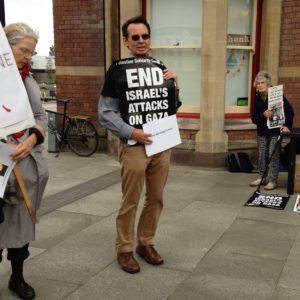
Phillip was an active member of several other campaigns: Stop Hinkley, Grow Heathrow, Runnymede Eco-warriors’ camp, Palestine Solidarity Campaign, CND, Campaign Against the Arms Trade, and he also supported Croughtonwatch and other groups opposed to American use of RAF bases and direction therefrom of drone attacks. Campaigning against the arms fair in London last September he was arrested the first morning, standing in front of an Israeli tank, and spent all day in the cells. The charge against him was, much later, dropped, but day after day, for months, he attended the trials of other protesters, giving them much needed advice and moral support.
In 1990 Phillip was in Haiti for the election of Jean-Bertrand Aristide and was outraged when an US-aided coup d’état toppled that government in 1991. In 1992 he joined the Haiti Support Group and very generously gave them his time and expertise. Haiti held a very important place in his heart. He kept saying that the world owed Haiti so much. He talked of the 1791 slave rebellion led by Toussaint L’Ouverture, which, in 1804, brought about the colony’s independence, the only slave uprising that led to a state free from slavery and run by non-whites and former captives. He was in Haiti to cover the 2010 earthquake and was very angry at the failure of the outside world to help Haiti properly and by the UN’s carelessness in deploying Nepalese soldiers with cholera there, so that thousands of Haitians, who had no immunity to the disease, subsequently died of it. He remained dedicated to Haiti’s cause until his death.
Phillip was a very active member of both North Devon and Torridge Green Parties (and, I think, the Green Party in East London, where he lived from 2017). He attended meetings, advised, nagged, cajoled, encouraged, and tirelessly pounded the streets, leafleting and canvassing for various candidates. He certainly was instrumental in getting Greens elected. He also campaigned for Caroline Lucas in Brighton, for Molly Scott Cato in Bristol and for other Green candidates in Dorset and the Isle of Wight.
Phillip was the author, or co-author, of several books, including Central America’s Indians (1984). The Maya of Guatemala (1989), Return of the Indian: Conquest and Revival in the Americas (1996), Tainting Evidence: Inside the Scandals at the FBI Crime Lab (1998), Collapse: When Buildings Fall Down (1999).
David Matthew Bailey, August 2018
Cathy Augustine, member of Oxfordshire KONP and delegate to the KONP Steering Group, Women’s Officer Wantage CLP, NHS campaigner and co-founder of Hands Off Our NHS and Oxfordshire Refugee Solidarity (with David Bailey, Norman Wood and Gwynne Reddick) remembers a comrade described by Jeremy Corbyn as:
A wonderful NHS campaigner and nurse, who I had the honour of knowing. People like David are the backbone of the NHS and of our country. [Jeremy Corbyn]
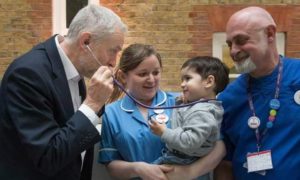
I’ve seen David as a single dad bringing up three wonderful children and encouraging them to become Labour party and union members and passing on to them his values of equality and justice. David’s eldest daughter now works for the NHS. I’ve seen him as a dedicated nurse of 35 years, whose commitment to patients drew admiration and praise from NHS colleagues. I’ve seen him as a talented photographer, recording demos, rallies, marches and campaigning events.
Together we’ve campaigned locally and nationally to save our NHS – organising demos and rallies in London and Oxford with David speaking at local meetings and to national TV and press; holding street stalls in all weathers to give out materials to raise public awareness of the work of Keep Our NHS Public (David was a member of Oxfordshire KONP) and the true facts & figures relating to NHS cuts; marching alongside Ken Loach, sharing a platform with Jonathan Ashworth and working with Jeremy Corbyn on publicity materials highlighting the need to save our NHS from cuts and privatisation. And for the last year of his life, I saw him dealing with a diagnosis of terminal cancer.
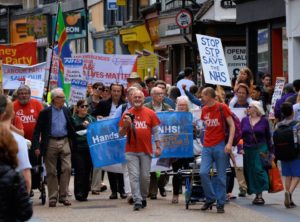 One of David’s many qualities was that he was always looking outwards not inwards – inclusive and bringing people together from NHS campaigns across the country. He did that in so many ways – through his relentless social media presence, TV and radio appearances, photography and writing – he was a regular on the Victoria Derbyshire show. Making such an impression with his presentation of the facts, articulate argument against cuts and privatisation, and dignified, calm approach that Victoria tweeted her sorrow and condolences when she heard that he had died.
One of David’s many qualities was that he was always looking outwards not inwards – inclusive and bringing people together from NHS campaigns across the country. He did that in so many ways – through his relentless social media presence, TV and radio appearances, photography and writing – he was a regular on the Victoria Derbyshire show. Making such an impression with his presentation of the facts, articulate argument against cuts and privatisation, and dignified, calm approach that Victoria tweeted her sorrow and condolences when she heard that he had died.
David worked closely with the People’s Assembly, KONP and HCT. He was involved with national campaigns including #BursaryOrBust and #ScrapTheCap as well as protests against the STPS, local health service cuts and closures. He wrote his own blog and numerous newsletters, tweets and posts on all these issues. David encouraged and inspired so many, gaining respect and love from fellow NHS campaigners, work and union colleagues and Labour Party members at all levels. It was David who encouraged NHS campaigners from across Oxfordshire – including myself, Norman and Gwynne – to join KONP and add our voices and effort to support their work.
Quietly determined, caring and with a wicked sense of humour – he treated everyone with the same straightforward, engaging approach. He had boundless energy and positivity, bringing people together, taking them along with him with no trace of self-importance. This stemmed from his view of everyone we work with as a human being, deserving of dignity and respect – whether they sit on
the shadow front bench, in a hospital bed, in a doorway in Oxford or in scrubland in Northern France. This is why the inclusive values of the NHS – as originally founded – were so important to him.
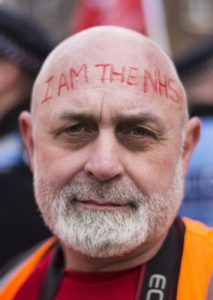 The courage, openness and honesty that David brought to his campaigning, publicising the truth behind government policy through personal experience, challenging the powerful – he also demonstrated in his response to his illness. From his very first blog “Breaking Bad News” he was clear that he would spend the year or so he had left fighting for our NHS. He continued to work as a nurse for as long as possible; he continued to take aid and comfort to refugees in Calais – washing and treating the feet of young men in the freezing cold, a few months after his diagnosis; he addressed a rally in Whitehall following a march of over 50,000 against the continued cuts and crisis in the NHS, on February 3 rd this year. He held our hands in his hospital bed and encouraged us to
The courage, openness and honesty that David brought to his campaigning, publicising the truth behind government policy through personal experience, challenging the powerful – he also demonstrated in his response to his illness. From his very first blog “Breaking Bad News” he was clear that he would spend the year or so he had left fighting for our NHS. He continued to work as a nurse for as long as possible; he continued to take aid and comfort to refugees in Calais – washing and treating the feet of young men in the freezing cold, a few months after his diagnosis; he addressed a rally in Whitehall following a march of over 50,000 against the continued cuts and crisis in the NHS, on February 3 rd this year. He held our hands in his hospital bed and encouraged us to
“stay angry and keep on doing what you’re doing.” He was always giving of himself and connecting us – to the very end – providing the framework and the glue to create the widest possible solidarity and effective action.
Throughout all this, David made time to be the best sort of friend and comrade – challenging, encouraging and inspiring. His humanity and friendship has profoundly changed my life, my outlook and my self-belief in the most positive way - and I know he has had this effect on many others. He’ll continue to inspire us, he’ll be with us shoulder to shoulder but I will miss him more than I can express.
I found a short poem that made me think of something that David might say to us today – encouraging us all to live our lives with happiness and compassion while continuing the fight – together in solidarity – to make the world a better place in general and particularly to save our NHS. It’s also very much “David” to offer comfort to us – as he did in health and illness with such love, dignity and generosity of spirit.
Turn again to life by Mary Lee Hall
If I should die, and leave you here awhile
Be not like others sore undone, who keep
Long vigils by the silent dust and weep.
For my sake, turn again to life, and smile,
Nerving thy heart and trembling hand to do
Something to comfort weaker hearts than thine.
Complete these dear unfinished tasks of mine,
And I, perchance, may therein comfort you!
[Obit. by Cathy Augustine]
Ken Dolan, December 2019
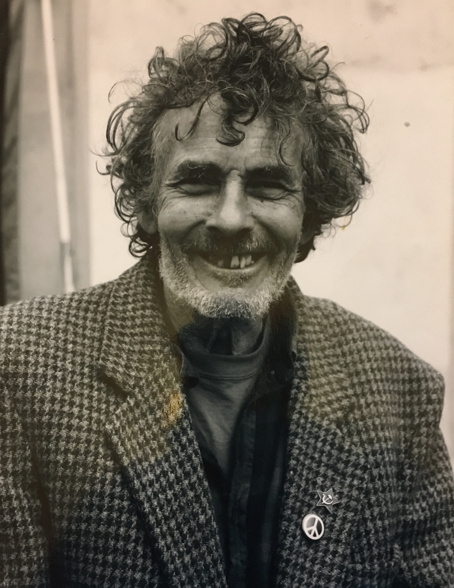
Ken Dolan, a committed campaigner for the NHS, died suddenly just before New
Year 2020. He leaves partner Jane and his three daughters – Kerry, Amy and Indi.
A celebration of his life on 25 th January 2020 in Rotherham saw several hundred
of his friends and comrades gather to remember this extraordinary community
activist and socialist. Ken had worked at a number of different jobs including
teacher, bus driver, construction worker, and gardener for the local council
(when he was also a tireless GMB union steward and fought effectively against
job losses).
As well as being a family man who loved playing with his children, a keen bird
and nature lover, he was also active in many different campaigns. These included
supporting the miners’ strike, the Orgreave Truth and Justice Campaign, the
Campaign for Nuclear Disarmament and most recently the fight for the NHS with
fellow campaigners in the South Yorkshire and Bassetlaw NHS Action Group.
This saw Ken out most weekends leafleting in Rotherham town centre, often
being moved on by the police until he successfully persuaded them this activity
was perfectly legal and he should be left to get on with it!
Fellow campaigners remember Ken for his absolute integrity and quietly going
about his networking activities in a way that furthered the cause. Ken had a
facility for talking to people and finding a way to connect and communicate, even
with initially disinterested health service managers. For example, he was able to
bring about a meeting where serious and respectful discussion with activists was
able to take place over detailed finances in the local health economy. Other
contributions to the life of the local community including support for the
Rotherham street kitchen, the fight for local parks, and support for victims of
child sexual exploitation. His epitaph might be one of the many comments made
by grieving friends: “He always made time for people - anyone who needed it”.
The celebration of his life demonstrated that his commitment to his family, local
community, and much wider principles to do with what makes a decent and
caring society will be greatly missed.
Pete Gillard, April 2020
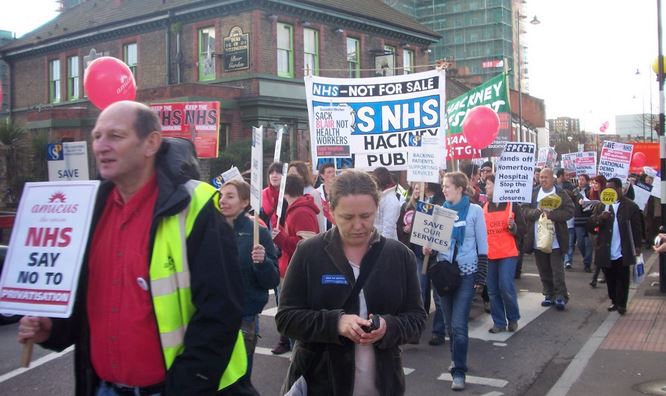
With great sadness, Keep Our NHS Public bids goodbye to Pete Gillard, who died on 21 April. Pete was a tireless health campaigner, a lifelong socialist and trade unionist, an Executive Committee member in Keep Our NHS Public and Treasurer for our sister organisation, Health Campaigns Together. He died some weeks after an operation for bladder cancer, after a spell in intensive care; tragically, his condition had appeared to be improving, until an infection (believed to be Covid-19) reversed this recovery and proved too much for his body to overcome.
The hospital in which Pete died, Ludlow Community Hospital, is still open today in great part due to the brilliant 2017 campaign against its closure. Pete and other activists were at the heart of that victorious fight – but understood very well that strength lay in numbers. Ludlow Hospital is safe because of the size and breadth of the campaign to keep it.
Pete was a founding member, alongside his partner Gill George, of Shropshire, Telford and Wrekin Defend Our NHS, which launched in March 2014 and quickly became a major force to be reckoned with at local level and a trailblazing outfit in national NHS campaigning. For the last 7 years, Pete’s relentless energy and work ethic and his keen eye for detail were at the heart of the group’s diligent and successful campaigns to defend local services against closures and centralisation.
Pete combined an unshakeable political commitment to defending universal care with an alert eye for where real victories could be won. Pete had little interest in the politics of ‘protest’. Defending the NHS was about making real gains and working alongside others to do this. Going down to glorious defeat doesn’t build confidence. But stopping NHS cuts, stopping closures, safeguarding valued services: these successes make people feel strong, and enable them to stand up to the powers that be. Pete always believed that campaigning for the NHS was about ordinary people gaining the confidence to make their voices heard and their power felt.
There was also a need, Pete believed, for absolute honesty. The NHS sometimes gets things wrong, and it is important for campaigners both to tell the truth and to demand better. In Shropshire, a small number of very brave bereaved parents battled for years for the truth following the avoidable deaths of their babies. The local hospital trust was dismissive. Parents were ignored. Babies were referred to as ‘it’. The number of deaths was systematically concealed. Trite phrases about ‘We’ve learned the lessons’ were trotted out again and again – but babies continued to die.
Pete and his partner Gill were proud to stand with parents and fight for change. The independent ‘Ockenden Review’ has yet to report, but this is set to be a scandal on a par with Mid-Staffordshire. Of course the Shropshire tragedies underline the need for adequate funding and staffing, but Pete recognised there were broader ‘cultural’ problems too. Women had to be listened to about their own health and needs; while the life and wellbeing of every baby had to be supremely important. And of course, when senior leaders at NHS organisations insist on hearing and telling only ‘good news stories’, it becomes close to impossible to learn from avoidable harm.
In Shropshire, Telford and Wrekin, there is a discredited plan – ‘Future Fit’ – that aims to close one of two A&Es, downgrade one of the District General Hospitals, and reduce access to both acute and planned care. It was meant to be all done and dusted by 2015. Now, in 2020, it is a ramshackle mess of a project that remains very far from implementation.
Shropshire, Telford and Wrekin Defend Our NHS has led the fight against Future Fit. Pete was central to the battle. He understood the need for detailed, careful work: for going to the long and boring meetings and reading the tedious documents. You have to know what health bosses are doing in order to challenge it effectively.
There was a second equally important strand to Pete’s approach, and to the wider philosophy of Defend Our NHS. Pete had an unswerving commitment to working with other people whenever there are areas of common concern. It makes no sense to defend an A&E or oppose a hospital closure only with people who believe the same things as you do or vote the same way as you. The experience of Shropshire shows it is perfectly possible to build successful and broad-based campaigns in small market towns and rural areas.
Beyond his health campaigning activity, Pete was a committed socialist and revolutionary throughout his life. He joined the student wing of the International Socialists in 1969 while studying at Durham, and went on to be a member of its successor organisation, the Socialist Workers Party. He remained in the SWP until 2013, when he was part of a large group of activists who left the party and formed a new organisation, rs21 (Revolutionary Socialism in the 21st Century), which Pete was an active member of for the rest of his life. He was also active in socialist organisations in the United States (where he lived from the mid-1980s to the early 1990s) and in the Netherlands (where he lived thereafter until he returned to London in 1998).
During his time in New York, he was active in solidarity with the ACT UP (AIDS Coalition to Unleash Power) movement, which was demanding action on the AIDS epidemic that was cutting a deadly swathe through LGBT communities at that time, with authorities adopting a posture of indifference. Pete was also a passionate internationalist and anti-racist – from his youth, when he fought against the far-right National Front as part of the Anti-Nazi League, to his later years, when he was a passionate opponent of the racist Hostile Environment regime that denies healthcare to many migrants and undocumented people in Britain.
In the days since Pete’s death, it has been crystal clear how many people found him to be an invaluable mentor and guide. Activist after activist, within Keep Our NHS Public, in the trade union movement and beyond, has recalled the care and dedication with which Pete assisted them in beginning their activity and mounting campaigns, and helped them to find their own confidence and capacity. Pete’s generosity with his time and his ideas meant that he played a central role in cultivating multiple new generations of activists, who will carry on the fight that Pete himself has now, finally, departed.
A more detailed biographical obituary has been published on the rs21 website by Charlie Hore, one of Pete’s lifelong friends.
Ron Singer
Ron Singer was a much respected GP, health activist and trade unionist member of KONP who died in May 2020 at the age of 72. Ron’s commitment to patients showed itself in many ways over the long years of his career. As a junior doctor in the 1970s, he organised colleagues to protest against cuts in Hackney Hospital where lack of beds meant patients were not receiving the care they needed. He played a key role in leading the 1975 junior doctor’s strike to shorten the 80-120 hour working week. Forty years later he was campaigning with today’s junior doctors, supporting them in their strike against Health Secretary Jeremy Hunt’s attempt to impose an “unsafe and unfair” contract.
From the early 1980s, Ron worked as a GP partner at the Forest Road practice in Edmonton, northeast London, where he stayed for more than 25 years. He was widely respected and loved by colleagues and patients alike. Ron campaigned to defend local services and to
extend healthcare to vulnerable people. In all he did, he was a voice for the voiceless, a principled yet considered colleague, and always committed to his patients and community. He campaigned to restore the NHS to the comprehensive, publicly funded, publicly provided service, free at the point of delivery that Aneurin Bevan intended, and was horrified at the privatisation and fragmentation brought about by market reforms. Through the Medical Practitioners Union (now ‘Doctors in Unite’) of which he was chair from 2000-2014, he promoted collaboration between general practises in opposition to the competition agenda of then Health Secretary, Kenneth Clarke.
In 1997 he edited a book in response to fundholding called 'GP Commissioning an Inevitable Evolution', and was an executive member of the National Association of Commissioning GPs. He was instrumental in persuading Stephen Dorrell, the then Tory health secretary, to agree in the 1990s to an alternative to the government’s fundholding model for GPs - Locality Based Commissioning. He also sat on the general practice committee of the British Medical Association (BMA) for over 20 years as a representative of Unite.
Ron fought tirelessly against Andrew Lansley’s catastrophic Health and Social Care Bill, memorably chasing the Secretary of State for Health down the corridor of the Royal Free Hospital shouting “your bill is rubbish and you know it”. In another video, Ron can be seen explaining in clear and simple language what the government's health reforms meant for patients and NHS staff. Here, he spoke on behalf of the many doctors who had serious concerns over the ongoing privatisation of the NHS. He warned that GPs in CCG would end up implementing cuts to services and castigated the BMA for not actively opposing the legislation.
Ron was a principled anti-racist who had campaigned against the National Front, and more recently for migrant’s rights. He visited the Calais Jungle in solidarity with refugees being forced to live in terrible conditions as they desperately waited for an opportunity, however hazardous, to cross to the UK. Appalled by the incompetence of Johnson’s Tory Government’s response to the COVID-19 pandemic he launched a ‘Doctors in Unite petition’ entitled: ‘The Government cant hid behind grateful applause: they must now fund the NHS properly
Ron loved music and was an accomplished trumpet player. He was a jazz enthusiast and one of his favourite pieces was Concerto de Aranjuez (Adagio) by Miles Davis. Diagnosed with polycythaemia in 2005, he had his first heart attack in 2006. Although forced to retire in 2007 due to ill health, he never stopped fighting injustice and continued his activism until he died. He is survived by his wife Jan, sister Jill and stepchildren Siobhan and Liam. Ron will be much missed by them and by the many, many others whose lives he touched and who were proud to call him their friend or comrade.
Ron was rightly regarded as a man of wisdom who gave considered views and could be relied upon for good advice. He believed in a fairer society and that a better world is possible. He has been described as “a pillar of medical politics, a man of great principles, and a great fighter gone and quite simply, the best of us”. KONP has lost a respected and committed fighter for the NHS, but one who leaves a legacy that inspires activists to even greater efforts in his memory.
This obituary was written by co-chair John Puntis.

